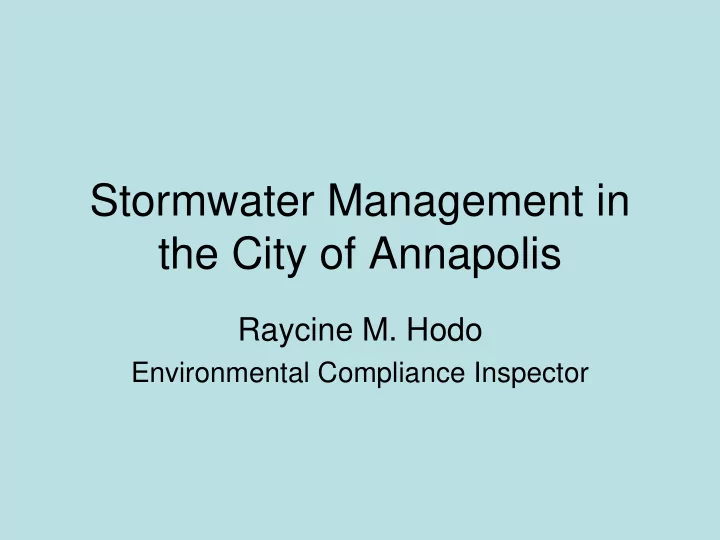

Stormwater Management in the City of Annapolis Raycine M. Hodo Environmental Compliance Inspector
City of Annapolis Watershed Implementation Plan • 12 sub-watersheds • 15 miles of natural streams • 38.5 percent impervious • Residential Neighborhoods • Commercial and Industrial Areas • Institutional Properties • State and County Roads
Project Goals • Comply with regulatory requirements including the 20% impervious area reduction • Improve water quality • Reduce runoff from rain events there by reducing localized flooding • Improve overall health of natural resources in the City • Support storm water utility
CHESAPEAKE BAY TMDL TMDL in 2010 for: • Sediment • Nitrogen • Phosphorus Target Reductions for 2025 • 25% less Nitrogen • 24% less Phosphorus • 20% less Sediment Target Reductions for 2017 • 60% of 2025 target reductions to be achieved
STORM WATER MANAGEMENT INVENTORY Summary of Inventory Total 351 Number Design Plan Sets Scanned Total 1,725 Number of Pages Scanned Total 741 Number of BMPs Identified
UPCOMING PROJECT TASKS Pollutant Load Modeling • Existing conditions • Proposed conditions Stormwater Management Concepts • 30% design • Detailed cost estimate • Utilities impacts • Environmental impacts • Recommended maintenance Evaluation and Ranking • Implementation Cost • Impervious area credits • Pollutant Removal Final report
Considerations Challenge • Funding Solution • Storm water utility • Grants • Chesapeake Bay Trust • Maryland Department of Natural Resources (MD DNR) Grants
Installing Stormwater Management Facilities • Stormwater Design Manual 2000 Volume I and II serves as the guide for stormwater management principles • Describes the Environmental Site Design (ESD) to the Maximum Extent Practicable (MEP) • ESD is Stormwater design strategies that seek to replicate natural hydrology
When is a Permit Required? • Limit of Disturbance (LOD) – Waterfront lot with greater than 2000 SF of disturbance – Non-Waterfront lot with greater than 5000 SF of disturbance • Excavation and Fill exceeds 100 CY total.
Grading Permits – The Three Phase Process • Concept Approval – Makes sure the overall design will work in theory – This may be covered in P&Z submission or FCA submission • Design Approval – Develops the design to construction ready documents – Review is completed by several departments including P&Z, DPW and DNEP • Final Design Approval – Final Design is sent to AASCD for approval – Collection of Bonding associated with the project – Development of Stormwater Maintenance Agreement
Stormwater Management Credit • Stormwater Management Credit Application for Residential • Site Plan showing property lines and location of stormwater management device. • For stormwater facilities installed through a grading permit with the City: A copy of the Stormwater Management Facility Maintenance Agreement. • Schedule a site visit which will be performed to verify your application.
Thanks • AECOM • Matthew Waters, Stormwater Management Engineer • Frank Biba, Chief Environmental Programs • Maria Broadbent, Director DNEP
Questions
Recommend
More recommend